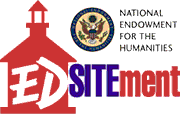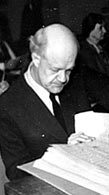 |
||
  |
||
| ||||||||||||||
Reference Shelf: Evaluating Online ResourcesAll sorts of information can be found on the
Internet, including misinformation, false information, and sheer fabrication.
We encourage you to apply these same criteria to the websites featured at EDSITEment. These sites have been selected through a year-long academic review process, developed by the National Endowment for the Humanities. This rigorous screening ensures high-quality content at all EDSITEment websites. Nonetheless, some of the sites may contain links to material that has not been screened or that may not be developmentally appropriate for some students. When you use EDSITEment resources in your classroom, be sure to preview the materials you plan to use. When you direct students to EDSITEment, be sure to remind them of their responsibilities as Internet researchers. Lesson plan: To emphasize these responsibilities, have your students, individually
or in teams, choose a topic for an Internet-wide search. They might look for information
about a particular author or a historical event or a cultural landmark. Have them
use the search [link] button on your browser to find one or two websites that
match their search terms. Then have them evaluate these sites using the six criteria
outlined above. In a class discussion, have students discuss and defend their
website evaluations. Remind students to cite websites as they would for a paper
or a project. Researchers
using information gathered on the Internet must cite their sources just as they
would cite conventional sources in traditional research. Citation standards have
been developed for electronic information based on the American
Psychological Association, Modern Language
Association and Chicago
Manual of Style conventions. For more information, consult the International
Federation of Library Associations and Institutions, Citation
Guides for Electronic Documents 1.Formulated by Elizabeth E. Kirk of the Milton S. Eisenhower Library at Johns Hopkins University. | ||||||||||||||
  |
||
| EDSITEment contains a variety of links to other websites and references to resources available through government, nonprofit, and commercial entities. These links and references are provided solely for informational purposes and the convenience of the user. Their inclusion does not constitute an endorsement. For more information, please click the Disclaimer icon. | ||
| Disclaimer | Conditions of Use | Privacy Policy Search
| Site
Map | Contact
Us | ||
